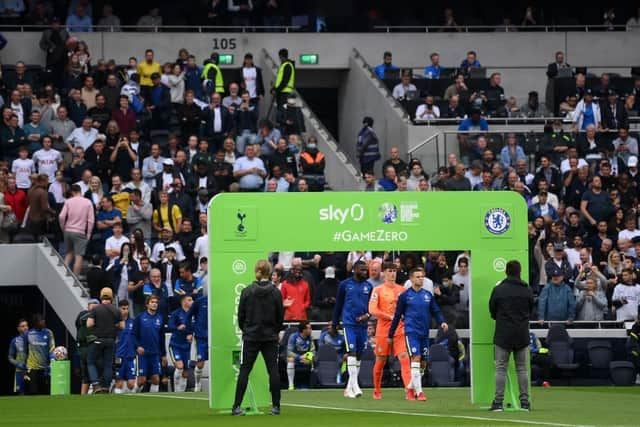Environment not the priority football pays lip-service to
Football loves little more than flexing its muscles as a global sport, and cramming in as many fixtures as possible for its television paymasters. That seems to be football’s biggest priority – not the welfare of its overworked elite players, and certainly not the planet they play on.
It is why, with the creation of the new Europa Conference League –which Leeds United will be hoping to qualify for as the next step in their progression – and the expansion of the Champions League, which is the end goal, the number of continental cup matches will increase by 55 per cent in the next four years.
Advertisement
Hide AdAdvertisement
Hide AdOf 96 group matches in the new Conference League, the BBC has calculated, 82 are between teams located more than 1,000km apart, and the average distance teams will travel is 5,578km. That is good for spreading the game and a bit more of its wealth, but terrible for the carbon footprint. It is not just about 11 players trekking around Europe – clubs travel with big squads, big entourages, supporters, media and even large UEFA teams of on and off-field officials.


This comes on the back of a European Championship which was played in 11 different countries. It would have been more but for coronavirus.
UEFA, European football’s governing body, is a signatory to the United Nations Sports for Climate Action Framework but it does not appear to have changed its thinking too much when it comes to cash-generating competitions. It talks about offsetting emissions but seems less concerned about creating them, and of the economic and social benefits of fans travelling.
There are conflicting issues at play and the environment is clearly not the priority UEFA pays lip-service too.
But in a global game, the problems extend beyond Europe.
Advertisement
Hide AdAdvertisement
Hide AdLeeds winger Raphinha boarded a private jet fitted out with bedrooms on a Friday morning in October to get from Manaus, a Brazilian city in the Amazonian rainforest, to Southampton in time for a Premier League game. He made it, and Leeds decided that after all that effort, he was not physically ready to play.
Meanwhile, Manchester United’s players were flying to Leicester – not Leicester in Sierra Leone or Leicester in Massachusetts, but Leicester in the east Midlands.
Covid-19 regulations have forced teams to travel to matches in two luxury coaches per game and at times three – good for preventing the spread of the virus, not great for the environment.
At least Chelsea and Tottenham Hotspur travelled to their recent game – billed as football’s first elite net zero match – on buses running on biofuel.
Advertisement
Hide AdAdvertisement
Hide AdLeeds and Sheffield United are far from unique in wearing strips made from recycled plastic and Whites striker Patrick Bamford says he has been inspired to do what Marcus Rashford has for under-privileged children when it comes to promoting environmental sustainability.
But there is far more to do. Leeds’s official website lists policies on Brand Protection, Customer Charter, Disciplinary Processes, Equality and Diversity, Gender Pay Gap, Matchday Protocol, the Modern Slavery Act, Safeguard and Whistleblowing, but not the environment.
When last season Premier League clubs were ranked according to their sustainability, Leeds and Sheffield United were tied in the bottom half of the table. It is not a table many supporters will be too bothered about. Spurs fans would swap being top of the Premier League’s sustainability rankings for being in front on football in a heartbeat – not that they are mutually exclusive.
Even so, it appears supporters are doing a better job of leading their clubs than vice-versa.
Advertisement
Hide AdAdvertisement
Hide AdLed by their socially-responsible manager, Harrogate-based Gareth Southgate, the England team has demonstrated what a powerful voice it can be for change.
The game is increasingly happy to speak out on racism, wear rainbow laces and promote diversity, champion the NHS and raise money for charities, to get involved in campaigns to support reading and numerous other worthy projects. Not closing people off from the game on the grounds of their skin colour or sexual orientation is in football’s direct interests.
Protecting the planet feels a much lower priority. Football is slowly waking up to it but there is a long way to go.